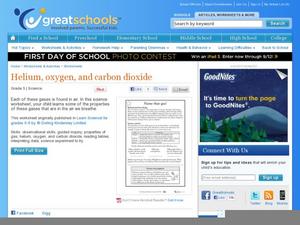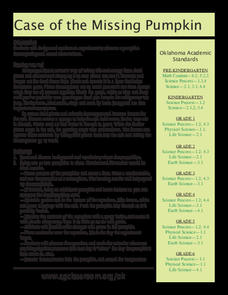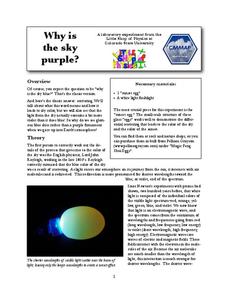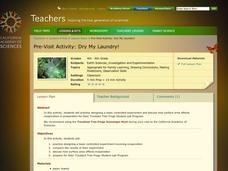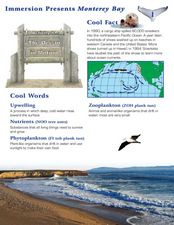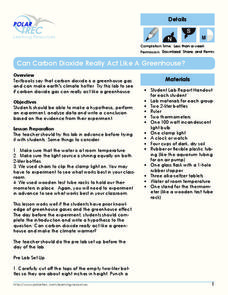Colorado State University
How Far Away Is Space?
Outer space may be a lot closer than you think! Science scholars model the layers of the atmosphere using transparencies to gain insight into the scale of space. The resource includes ideas to tailor the activity to the skill level of...
Curated OER
Dinnertime for Animals
Is a deer an herbivore? What about a spider? Experiment with the food chain in an interactive science experiment. After listing the herbivores from a selection of animals, third and fourth graders compare the skulls and teeth of...
Curated OER
Name That Gas!
Young scientists discover that air is a mixture of different gases - mainly nitrogen and oxygen. The properties of some of the other gases found in oxygen are listed in a table, then learners must decide which one of those gases is...
American Museum of Natural History
Meet the Universe's Main Attraction ... Gravity
Learners read a short description about gravity and what it does and then explore the two ideas about how gravity works. After gaining a better understanding of the concept, individuals participate in a thorough experiment on what would...
Curated OER
Case of the Missing Pumpkin
Scientists define and discuss decomposition, and watch pumpkins decompose and return to soil in classroom experiment. They record the date the experiment began, chart changes in pumpkins on a calendar, count how many days it takes...
Colorado State University
Why Is the Sky Purple?
The color of the sky depends on the time of day. Young scholars experiment with scattering different wavelengths of light to recreate the color of the sky. They observe both the longer blue wavelengths and the shorter red and orange...
Curated OER
Simple Machines IV - Levers
The lever is an everyday simple machine. Youngsters learn the principles of levers and explore their many uses. Groups of pupils perform a simple lab where they lift objects with a fulcrum while placing the load in a variety of...
Curated OER
Exploring Electricity - Four Activities
These are four classic activities used for instructing upper elementary electricians. The first involves experimenting with the Van de Graaff generator. The second is a series of hands-on experiences with static. In the third activity,...
Kenan Fellows
Terrarium in a Bottle: Modeling the Atmosphere, Greenhouse Effect, and Water Cycle
You've heard of farm to table ... but what about farm in classroom? Junior agriculturalists embark upon a two-week journey into the science of growing things. Based upon the classic terrarium in a two-liter experiment, the instructional...
Curated OER
Bouncing Bubbles
Students complete a variety of activities exploring the joys and science of bubbles. They listen to the book "Bubbles Bubbles" by Mercer Mayer, create a bubble picture using Kid Pix, and explore blowing bubbles. Students experiment...
California Academy of Science
Dry My Laundry!
Meant to be a pre-field trip lesson plan, this can also serve as a cute and simple activity to use when your little ones are learning about evaporation or surface area. The children cut tiny t-shirts out of paper towel material, wet...
Discovery Education
Smoke on the Water
How do clouds form? Learners demonstrate the formation of clouds and the water cycle by testing four different setups in a plastic bottle. They identify the key components of a cloud to help them understand the process of cloud...
Curated OER
Breathing Victory
Students know that participation in sports requires energy. They comprehend that we get energy form the foods that we eat and the air thta we breathe. Converting food and air into usable energy is defined as celluar respiration. Students...
Curated OER
Summer Body Activity: A Nose Workout
Students have sensory experiences with the sweet smell of discovery. In this early childhood science instructional activity, students use their sense of smell as they create and compare their very own fragrance essences with a variety of...
Scholastic
Acceleration Nation Guide
Discover the science of NASCAR! Young scholars rev up their learning as they explore aerodynamic principles. Hands-on activities help learners understand concepts of friction, kinetic energy, and potential energy.
Curated OER
Name That Leaf
Take a walk through nature with a science experiment about leaves. Third graders use a branching diagram to group attributes of certain kinds of leaves, such as oak, pine, and chestnut. For extra practice, they can collect leaves and...
Science Friday
Capturing Carbon Dioxide
Why don't we just capture carbon dioxide in the air and store it somewhere else? A hands-on lesson allows scholars to explore a complex concept. First, they will create a carbonated beverage, and then they will determine if liquid...
Exploratorium
Falling Feather
Whether or not Galileo actually dropped balls from the Leaning Tower of Pisa, this demonstration will solidly demonstrate that objects are accelerated at the same rate, regardless of mass. You will, however, need a vacuum pump and a few...
Curated OER
Break the Tension
Learners experiment with the concepts of surface tension. They participate in a number of different experiments that introduce them to surface tension. They work in a small group in order to conduct these experiments.
Teach Engineering
Egg-cellent Landing
The classic egg-drop experiment gets a new bounce with an activity that asks pairs to design a lander similar to one used to land a rover on Mars within a fixed budget. The activity provides a great introduction to the idea of terminal...
Curated OER
Monterey Bay
Students read background information about Monterey Bay, California, and conduct related experiments. In this ocean in motion lesson, students read information about the location, wildlife, and characteristics of Monterey Bay. They...
Curated OER
It's Just Dirt
Students discover how seed germination varies according to the soil type. For this soil science lesson, students discuss what plants need in order to grow and investigate various types of soil. Students use their senses to describe each...
Alabama Learning Exchange
Float or Sink?
Experiment with mass and density as scholars figure out what makes things float or sink. First, they watch a podcast introducing these concepts. Be sure to use the comprehension question to test their understanding. Young scientists...
Polar Trec
Can Carbon Dioxide Act Like a Greenhouse Gas?
Ninety-seven percent of scientists who study climate agree that human activity is warming the planet. Learners explore carbon dioxide as a greenhouse gas, a gas causing this warming, through a hands-on experiment. Once complete, they...




